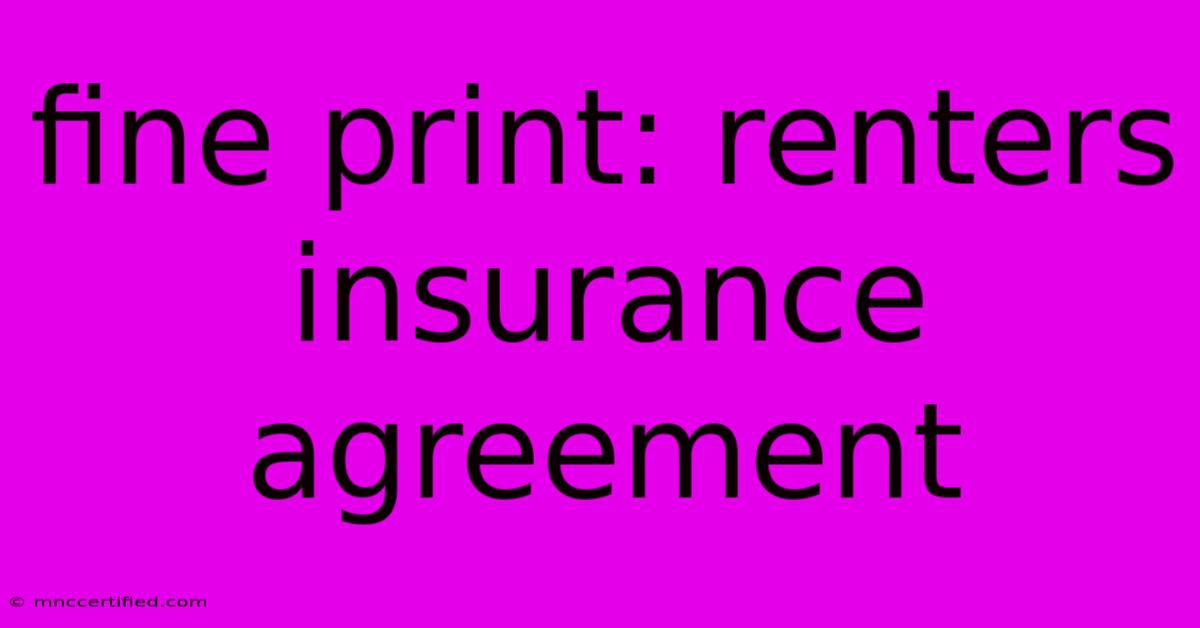Fine Print: Renters Insurance Agreement

Table of Contents
Unpacking the Fine Print: Understanding Your Renters Insurance Agreement
Renters insurance is a crucial safety net, protecting your belongings from unexpected events like fires, theft, and natural disasters. But before you sign on the dotted line, it's crucial to understand the fine print of your policy. This comprehensive guide will demystify the key elements of a renters insurance agreement, helping you make informed decisions about your coverage.
What Does Renters Insurance Cover?
Renters insurance typically covers:
- Personal Property: This is the core of your policy, covering your belongings like furniture, electronics, clothing, and personal items.
- Liability: Protects you if someone is injured on your property or you accidentally damage someone else's property.
- Additional Living Expenses: Provides temporary housing and living expenses if your apartment is uninhabitable due to a covered event.
Important Note: Coverage limits and specific details vary depending on your insurer and the policy you choose.
Decoding the Fine Print: Crucial Clauses to Review
1. Deductible: This is the amount you pay out of pocket before your insurance kicks in. A higher deductible usually means lower premiums. Make sure you can comfortably afford the deductible in case of a claim.
2. Coverage Limits: Your policy will outline maximum amounts for each type of coverage. Carefully consider your belongings' value and choose limits that adequately protect you.
3. Exclusions: This section outlines events or situations not covered by your policy. Common exclusions include:
- Earthquakes and floods: These require separate insurance policies.
- Negligence: You may not be covered for damage caused by your own carelessness.
- Certain types of property: Some items, like valuable jewelry or art, may require additional coverage.
4. Claims Process: Understand how to file a claim, the required documentation, and the timeframe for processing.
5. Cancellation/Renewal: Review the conditions for canceling your policy or renewing it.
6. Endorsements: These are optional add-ons that can enhance your coverage, such as:
- Replacement cost coverage: Pays the full replacement value of your belongings, even if they have depreciated.
- Personal injury liability: Covers medical expenses for injuries you accidentally inflict on others.
Tips for Navigating the Fine Print
- Read the entire policy: Don't just skim the highlights. Pay close attention to the fine print to ensure full understanding.
- Ask questions: Don't hesitate to contact your insurer if you have any doubts or need clarification.
- Compare policies: Obtain quotes from multiple insurers to compare coverage options and prices.
- Review your policy regularly: Make sure your coverage still meets your needs, especially if your belongings have increased in value.
The Importance of Having Renters Insurance
While it's a small monthly expense, renters insurance provides significant protection against unexpected losses. It ensures financial security, peace of mind, and the ability to rebuild your life after a devastating event.
Remember: It's not just about protecting your belongings, but also safeguarding your financial well-being. By understanding the fine print of your renters insurance policy, you can make informed decisions and ensure you have the right coverage to meet your specific needs.

Thank you for visiting our website wich cover about Fine Print: Renters Insurance Agreement. We hope the information provided has been useful to you. Feel free to contact us if you have any questions or need further assistance. See you next time and dont miss to bookmark.
Featured Posts
-
Kyle Hamilton Injury Harbaughs Latest Update
Nov 08, 2024
-
Noah Kahan Gracie Abrams Hyde Park Show
Nov 08, 2024
-
Mortgage Investment Services Corporation
Nov 08, 2024
-
Hamas Terrorists Watch Al Jazeera Discuss Captive
Nov 08, 2024
-
Borrow From 401k For Investment Property
Nov 08, 2024